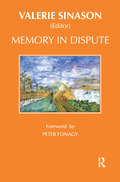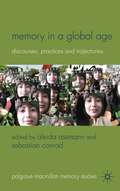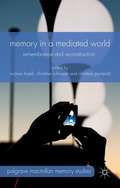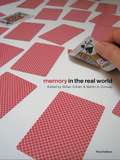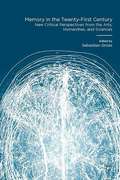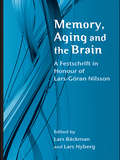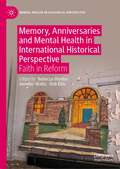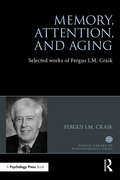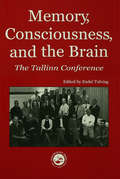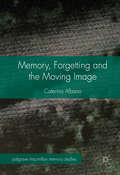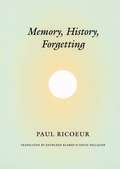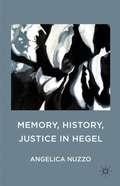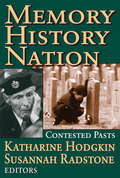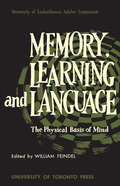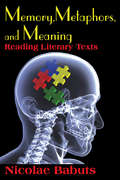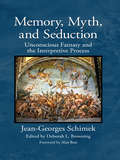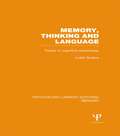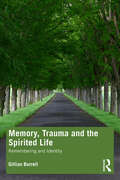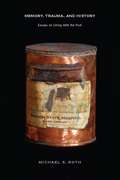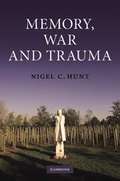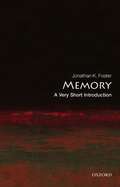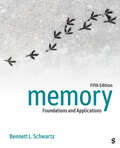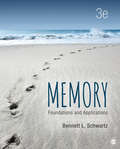- Table View
- List View
Memory in Dispute
by Valerie SinasonIn this opening chapter, Gwen Adshead provides a careful overview of the research literature concerning the main issues in this debate. She includes legal issues and child and adult memory in her remit.
Memory in a Global Age
by Sebastian Conrad Aleida AssmannA significant contribution to memory studies and part of an emergent strand of work on global memory. This book offers important insights on topics relating to memory, globalization, international politics, international relations, Holocaust studies and media and communication studies.
Memory in a Mediated World: Remembrance and Reconstruction (Palgrave Macmillan Memory Studies)
by Andrea Hajek Christian Pentzold Christine LohmeierConsidering both retrospective memories and the prospective employment of memories, Memory in a Mediated World examines troubled times that demand resolution, recovery and restoration. Its contributions provide empirically grounded analyses of how media are employed by individuals and social groups to connect the past, the present and the future.
Memory in the Real World (3rd Edition)
by Gillian Cohen Martin A. ConwayThis fully revised and updated third edition of the highly acclaimed Memory in the Real World includes recent research in all areas of everyday memory. Distinguished researchers have contributed new and updated material in their own areas of expertise. The controversy about the value of naturalistic research, as opposed to traditional laboratory methods, is outlined, and the two approaches are seen to have converged and become complementary rather than antagonistic. The editors bring together studies on many different topics, such as memory for plans and actions, for names and faces, for routes and maps, life experiences and flashbulb memory, and eyewitness memory. Emphasis is also given to the role of memory in consciousness and metacognition. New topics covered in this edition include life span development of memory, collaborative remembering, deja-vu and memory dysfunction in the real world. Memory in the Real World will be of continuing appeal to students and researchers in the area.
Memory in the Twenty-First Century: New Critical Perspectives from the Arts, Humanities, and Sciences
by Sebastian GroesThis book maps and analyses the changing state of memory at the start of the twenty-first century in essays written by scientists, scholars and writers. It recontextualises memory by investigating the impact of new conditions such as the digital revolution, climate change and an ageing population on our world.
Memory, Aging and the Brain: A Festschrift in Honour of Lars-Göran Nilsson (Psychology Press Festschrift Series)
by Lars Bäckman Lars NybergThis book brings together some of the best known experts in their fields to offer a cross-disciplinary summary of current research on human memory. More than this however, the book pays tribute to the work of Lars-Göran Nilsson and his many contributions to the psychology of human memory. The book is divided into three subsections: General Issues in Human Memory, Memory and Aging, and Memory and the Brain. These sections represent the three cornerstones in Lars-Göran's scientific career and comprise contributions from senior collaborators, colleagues and former students. Areas of discussion include: long-term and working memory: how do they interact? an epidemiological approach to cognitive health in aging the cognitive neuroscience of signed language Covering a broad range of topics, Memory, Aging and the Brain will be of great interest to all those involved in the study and research of human memory.
Memory, Anniversaries and Mental Health in International Historical Perspective: Faith in Reform (Mental Health in Historical Perspective)
by Rob Ellis Jennifer Wallis Rebecca WynterThis book is the first to explore memory, misremembering, forgetting, and anniversaries in the history of psychiatry and mental health. It challenges simplistic representations of the callous nature of mental health care in the past, while at the same time eschewing a celebratory and uncritical marking of anniversaries and individuals. Asking critical questions of the early Whiggish histories of mental health care, the book problematizes the idea of a shared professional and institutional history, and the abiding faith placed in the reform of medicine, administration, and even patients. It contends that much post-1800 legislation drafted to ensure reform, acted to preserve beliefs about the ‘bad old days’ and a ‘brighter future’ in the state memories of imperial powers, which in turn exported these notions around the world. Conversely, the collection demonstrates the variety of remembering and forgetting, building on recent interest in the ideological and cultural linkages between past and present in international psychiatric practice. In this way, it seeks to trace the pathways of memory, exploring the direction of travel, and the perpetuation, remodeling, and uprooting of recollection.Chapter “The New Socialist Citizen and ‘Forgetting’ Authoritarianism: Psychiatry, Psychoanalysis, and Revolution in Socialist Yugoslavia” is available open access under a Creative Commons Attribution 4.0 International License via link.springer. com.
Memory, Attention, and Aging: Selected Works of Fergus I. M. Craik (World Library of Psychologists)
by Fergus I. CraikMemory, Attention, and Aging is a collection of some of the most influential journal articles previously published by Fergus Craik and his collaborators, with new introductory material unifying the research of this noted cognitive psychologist. The reprinted articles are grouped into six sections reflecting Craik’s various research interests across his career. The first section on short-term memory focuses on research concerns Craik uncovered in the 1970s, but are still valid today. They comprise theoretical suggestions and data on the nature of STM, including the notion that working memory may be defined as attention paid to features of items held in conscious awareness. The second section on levels of processing contains the very influential articles by Craik & Lockhart and by Craik & Tulving on memory research, in addition to a later article in which Craik gives a critical account of the LOP work. Craik’s third interest is in cognitive aging. The section contains two articles from the 1980s in which Craik lays out his ideas on age-related changes in memory, plus a more recent article addressing lifespan changes in cognition. The fourth section on attention and memory has two articles that report on the effects of divided attention on subsequent memory, and differences between implicit and explicit memory processes. The fifth section on cognitive neuroscience includes an early PET study probing neural correlates of LOP, and a study searching for the neural correlates of the "self" concept. Finally, the sixth section contains an article on bilingualism that explores age-related differences in executive functions as a consequence of bilingualism, and a study showing that bilingualism postpones the onset of Alzheimer’s disease. Grouping the most highly cited and groundbreaking articles of Fergus Craik in one volume, this book will be of interest to a wide spectrum of students and professional researchers.
Memory, Consciousness and the Brain: The Tallinn Conference
by Endel TulvingMemory and consciousness have been objects of fascination to psychologists and other brain scientists for over one hundred years. Because of the complexity of the two topics, however, and despite great efforts spent on their study, the progress in their understanding over most of this time has been rather slow. Recently, thanks to new techniques and to changing pre-theoretical orientations, the study of the role of the brain in memory and consciousness has received an immense boost, and has become a central focus of research activity by thousands of researchers worldwide.The volume reviews recent progress on our understanding of memory, consciousness and the brain and identifies a number of acute outstanding problems. The purpose of the volume, based on a conference in Tallinn, is to look to the future, and not simply to share knowledge from ongoing research. In this sense, the volume does not contain a comprehensive overview of the field, but rather showcases a selection of exciting ideas in cognitive neuroscience. Contributors include some of the world's best-known cognitive brain scientists who have greatly contributed to our understanding of memory as a relation between the brain and the mind, as well as a number of highly promising younger researchers in the field. Memory, Consciousness and the Brain will be essential reading for anyone interested in the latest cutting-edge thinking at the interface of these topics, and in the future directions in which it may take us.
Memory, Forgetting and the Moving Image
by Caterina AlbanoThroughout this book we discover what our idea of memory would be without the moving image. This thought provoking analysis examines how the medium has informed modern and contemporary models of memory. The book examines the ways in which cinematic optic procedures inform an understanding of memory processes. Critical to the reciprocity of mind and screen is forgetting and the problematic that it inscribes into memory and its relation to contested histories. Through a consideration of artworks (film/video and sound installation) by artists whose practice has consistently engaged with issues surrounding memory, amnesia and trauma, the book brings to bear neuro-psychological insight and its implication with the moving image (as both image and sound) to a consideration of the global landscape of memory and the politics of memory that inform them. The artists featured include Kerry Tribe, Shona Illingworth, Bill Fontana, Lutz Becker, Yervant Gianikian and Angela Ricci Lucchi, Harun Faorcki, and Eyal Sivan.
Memory, History, Forgetting
by Paul Ricoeur Kathleen Blamey David Pellauer"Memory, History, Forgetting", like its title, is divided into three major sections. Ricoeur first takes a phenomenological approach to memory and mnemonical devices. The underlying question here is how a memory of present can be of something absent, the past. The second section addresses recent work by historians by reopening the question of the nature and truth of historical knowledge. Ricoeur explores whether historians, who can write a history of memory, can truly break with all dependence on memory, including memories that resist representation. The third and final section is a profound meditation on the necessity of forgetting as a condition for the possibility of remembering, and whether there can be something like happy forgetting in parallel to happy memory. Throughout the book there are careful and close readings of the texts of Aristotle and Plato, of Descartes and Kant, and of Halbwachs and Pierre Nora.
Memory, History, Justice in Hegel
by Angelica NuzzoThis reconstruction of the work of 'dialectical memory' in Hegel raises the fundamental question of the principle that presides on the articulation of history and indicates in Hegel's philosophy two alternative models of conceiving history: one that grounds history on 'ethical memory,' the other that sees justice as the moving principle of history.
Memory, History, Nation: Contested Pasts (Memory And Narrative Ser.)
by Susannah Radstone Katharine HodgkinIn the last decade, a focus on memory in the human sciences has encouraged new approaches to the study of the past. As the humanities and social sciences have put into question their own claims to objectivity, authority, and universality, memory has appeared to offer a way of engaging with knowledge of the past as inevitably partial, subjective, and local. At the same time, memory and memorial practices have become sites of contestation, and the politics of memory are increasingly prominent. This inter-disciplinary volume demonstrates, from a range of perspectives, the complex cultural work and struggles over meaning that lie at the heart of what we call memory.The chapters in this volume offer a complex awareness of the workings of memory, and the ways in which different or changing histories may be explained. They explore the relation between individual and social memory, between real and imaginary, event and fantasy, history and myth. Contradictory accounts, or memories in direct contradiction to the historical record are not always the sign of a repressive authority attempting to cover something up. The tension between memory as a safeguard against attempts to silence dissenting voices, and memory's own implication in that silencing, runs throughout the book. Topics covered range from the Basque country to Cambodia, from Hungary to South Africa, from the Finnish Civil War to the cult Jim Jarmusch movie Dead Man, from the Rock and Roll Hall of Fame to Australia. Part I, ""Transforming Memory"" is concerned primarily with the social and personal transmission of memory across time and generations. Part II, ""Remembering Suffering: Trauma and History,"" brings the after-effects of catastrophe to the fore. Part III, ""Patterning the National Past,"" the relation between nation and memory is the central issue. Part IV, ""And Then Silence,"" reflects on the complex and multiple meaning of silence and oblivion, wherein amnesia is often used as a figure for the denial of shamefu
Memory, Language, and Bilingualism
by Jeanette Altarriba Ludmila Isurin"The relationship between memory and language and the topic of bilingualism are important areas of research in both psychology and linguistics and are grounded in cognitive and linguistic paradigms, theories and experimentation. This volume provides an integrated theoretical/real-world approach to second language learning, use and processing from a cognitive perspective. A strong international and interdisciplinary team of contributors present the results of various explorations into bilingual language processing, from recent advances in studies on bilingual memory to studies on the role of the brain in language processing and language forgetting. This is a strong yet balanced combination of theoretical/overview contributions and accounts of novel, original, empirical studies which will educate readers on the relationship between theory, cognitive experimentation and data and their role in understanding language learning and practice"--
Memory, Learning and Language: The Physical Basis
by William FeindelThe symposium was arranged with the purpose of cutting across some of the lines dividing various disciplines all having a common interest in different aspects of the functioning of the brain. The essays, given originally as lectures at one of the Jubilee celebrations of the University of Saskatchewan, were deliberately designed to be of interest to laymen concerned with the problem of education as well as to academics dealing daily with products of the brain's activity in teaching and learning. One of the main themes of the book is that the human brain has far greater potentialities than our present methods of education are exploiting; another is that, although our universities can be said to owe their very existence to the multiplex activities of the human mind, the subject of how the brain functions and the application of even our rather meagre knowledge of this field to the sphere of teaching and learning remains greatly neglected in university programmes. The subject of brain function, studied daily by the neurologist and neuro-surgeon, should gain the interest of non-medical fields concerned with utilizing the mechanism of the mind.
Memory, Metaphors, and Meaning: Reading Literary Texts
by Nicolae BabutsLiterature explores the human condition, the mystery of the world, life and death, as well as our relations with others, and our desires and dreams. It differs from science in its aims and methods, but Babuts shows in other respects that literature has much common ground with science. Both aim for an authentic version of truth. To this end, literature employs metaphors, and it does so in a manner similar to that of scientific inquiry.The cognitive view does not imply that there is a one-to-one correlation between the world and text, that meaning belongs to the author, or that literature is equivalent to perception. What it does maintain is that meaning is crucially dependent on mnemonic initiatives and that without memory, the world remains meaningless. Nicolae Babuts claims that at the interface with the printed page, readers process texts in a manner similar to the way they explain the visible world: in segments or units of meaning or dynamic patterns.Babuts argues that humans achieve recognition by integrating stimulus sequences with corresponding patterns that recognize and interpret each segment of a text. Memory produces meaning from these patterns. In harmony with its goals, memory may adopt specific strategies to deal with different stimuli. Dynamic patterns link the unit of processing with the unit of meaning. In sum, Babuts proposes that meaning is achieved through metaphors and narrative, and that both are ways to reach cognitive goals. This original study offers perspectives that will interest cognitive psychologists, as well as those simply interested in the process through which literature stirs the human imagination.
Memory, Myth, and Seduction: Unconscious Fantasy and the Interpretive Process (Psychological Issues)
by Jean-Georges SchimekMemory, Myth, and Seduction reveals the development and evolution of Jean-Georges Schimek's thinking on unconscious fantasy and the interpretive process derived from a close reading of Freud as well as contemporary psychoanalysis. Contributing richly to North American psychoanalytic thought, Schimek challenges local views from the perspective of continental discourse. A practicing psychoanalyst, teacher, and consummate Freud scholar, Schimek sought to clarify Freud's concepts and theories and to disentangle complexities borne of inconsistencies in Freud's assumptions and expositions. This book is divided thematically into three sections. The first concerns fantasy and interpretation as they play out in the analytic situation, and the manner in which analyst and patient coconstruct meaning and reconstruct and recover memory. The second consists of two seminal papers which provide the sequence of steps in the five revisions in Freud's seduction theory. Schimek's careful scholarship lays out the data of Freud's writing, which allows one to draw one's own conclusions about the implications of the changes in the theory that he made. In the third, more theoretical section, he provides a foundation for understanding many of today's discussions about unconscious fantasy, dreaming, remembering, consciousness, affect, self-reflection, mentalization, and implicit relational knowing. He clarifies and illustrates Freud's original formulations (and their inherent problems) through a careful reading of sections of The Interpretation of Dreams, and a study of Freud's famous Signorelli parapraxis. Skillfully arranged and carefully edited by Deborah Browning and including a foreword by Alan Bass, this collection of Schimek's published and unpublished papers will be of interest to practicing psychoanalysts, psychoanalytically-oriented psychotherapists, and students of the history of ideas and philosophy who have a particular interest in fantasy, interpretation, and Freud.
Memory, Thinking and Language: Topics in Cognitive Psychology (Psychology Library Editions: Memory)
by Judith GreeneIn the ten years prior to its original publication in 1987, cognitive psychology uncovered the increasingly important role of knowledge stored in memory and the integrated nature of cognitive processes. In Memory, Thinking and Language the author takes these three traditional topics and places them within the new cognitive approach. Judith Greene’s 1975 book Thinking and Language, proved to be a highly successful student resource. This book provides an equally clear introduction to complex ideas. It also emphasises the practical applications of cognitive psychology for teaching and learning as well as for everyday life.
Memory, Trauma and the Spirited Life: Remembering and Identity
by Gillian BurrellMemory, Trauma and the Spirited Life offers a unique understanding of memory’s role in developing as a person, in navigating the course of life, and in mitigating emotional pain. This book develops the idea that memory, by what it endows, requires work of us that entails responsibility: to the self, the other, to the planet and to the living and the dead. Discussing the concept of memory and what it provides from the ancients to the present, Burrell draws on such writers as E. M. Forster and Rosa Luxemburg, Walter Benjamin, Tzvetan Todarov and Edward Said, as well as Susan Rubin Suleiman and Paul Ricoeur, to explore the operation of cultural and collective memory, trauma, otherness and the possibility for forgiveness. By means of richly detailed clinical vignettes, the author provides a psychoanalytic perspective to illustrate the transformative power of memory in coming to terms with the past, thereby making it essential reading for psychoanalysts and psychotherapists in practice and in training, as well as those with interests in history, literature, identity, the treatment of trauma and the question of hope.
Memory, Trauma, and History: Essays on Living with the Past
by Michael RothIn these essays, Michael S. Roth uses psychoanalysis to build a richer understanding of history, and then takes a more expansive conception of history to decode the cultural construction of memory. He first examines the development in nineteenth-century France of medical criteria for diagnosing memory disorders, which signal fundamental changes in the understanding of present and past. He next explores links between historical consciousness and issues relating to the psyche, including trauma and repression and hypnosis and therapy. Roth turns to the work of postmodern theorists in connection with the philosophy of history and then examines photography's capacity to capture traces of the past. He considers how we strive to be faithful to the past even when we don't care about getting it right or using it productively. Roth concludes with essays defending pragmatic and reflexive liberal education. Drawing on his experiences as a teacher and academic leader, he speaks of living with the past without being dominated by it.
Memory, War and Trauma
by Nigel C. Hunt<p>Many millions of people are affected by the trauma of war. Psychologists have a good understanding of how experiences of war impact on memory but the significance of external environmental influences is often disregarded. Memory, War and Trauma focuses on our understanding of the psychosocial impact of war in its broadest sense. Nigel C. Hunt argues that, in order to understand war trauma, it is critical to develop an understanding not only of the individual perspective but also of how societal and cultural factors impact on the outcome of an individual's experience. <p>This is a compelling book which helps demonstrate why some people suffer from post-traumatic stress when other people don't, and how narrative understanding is important to the healing process. Its multi-disciplinary perspective will enable a deeper understanding of both individual traumatic stress and the structures of memory. </p>
Memory: A Very Short Introduction
by Jonathan K. Foster"Why can we sometimes remember events from our childhood as if they happened yesterday, but not what we did last week? How are memories stored in the brain, and how does our memory change as we age? What happens when our memory goes wrong, and how easy is it for others to manipulate our memories?" "This fascinating Very Short Introduction brings together the latest research in psychology and neuroscience to address these and many other important questions about the science of memory - revealing how our memory works, why we couldn't live without it, and even how we may learn to remember more."--BOOK JACKET.
Memory: Foundations and Applications
by Bennett L. SchwartzMemory: Foundations and Applications covers key memory models, theories, and experiments, and demonstrates how students can improve their own ability to learn and remember. The new Fifth Edition includes research updates throughout, attention to individual, cross-linguistic, and cross-cultural differences, and support with how to assess evidence while minimizing personal bias to help students evaluate claims.
Memory: Foundations and Applications
by Bennett L. SchwartzMemory: Foundations and Applications covers key memory models, theories, and experiments, and demonstrates how students can improve their own ability to learn and remember. The new Fifth Edition includes research updates throughout, attention to individual, cross-linguistic, and cross-cultural differences, and support with how to assess evidence while minimizing personal bias to help students evaluate claims.
Memory: Foundations and Applications
by Dr Bennett L. SchwartzThe fully updated Third Edition of Bennett L. Schwartz’s Memory: Foundations and Applications engages students in an exploration of how memory works in everyday life through unique applications in areas such as education, job-related memory, investigations, and courtrooms. Throughout the book, integrated coverage of cognitive psychology and neuroscience connects theory and research to the areas in the brain where memory processes occur. Four overarching themes that create a framework for the text include: the active nature of learning and remembering; memory's status as a biological process; the multiple components of memory systems; and how memory principles can improve our individual ability to learn and remember. Featuring substantive changes that bring the book completely up to date, the Third Edition offers students an array of high-interest examples for augmenting their own memory abilities and appreciation of memory science.
